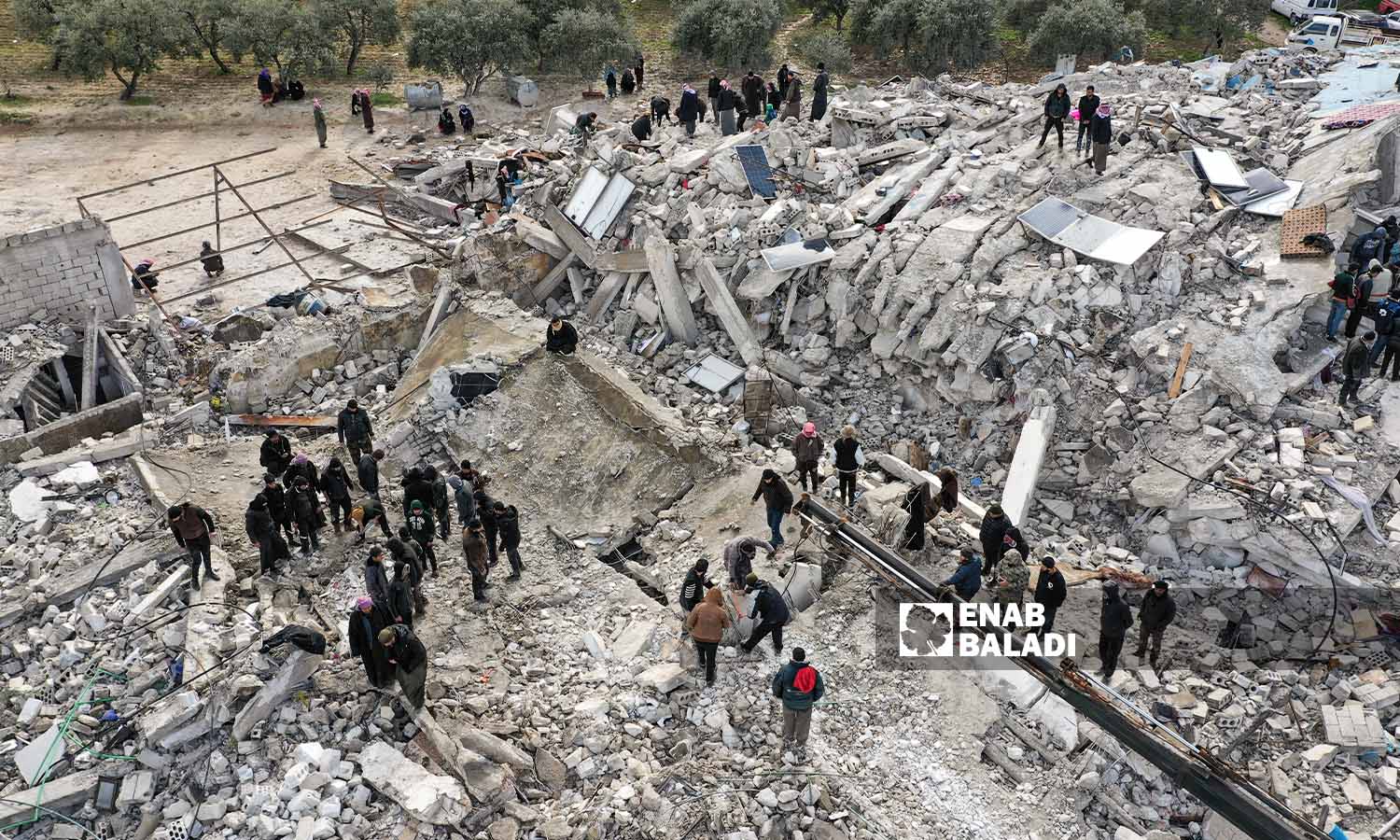



Since the devastating earthquake that struck Turkey and Syria last Monday, the Syrian regime has proceeded to deliver a political speech that manages and politicizes the humanitarian crisis.
Through its officials, the Syrian regime inserted US and European sanctions into the issue of the earthquake damages and dealt with it on a media level as an impediment to the humanitarian response.
On Monday, Syrian Foreign Minister Faisal Mekdad held a meeting with representatives of UN agencies and offices in Syria, as well as representatives of non-governmental organizations (NGOs).
During the meeting, Mekdad noted the impact of “unilateral” sanctions, which further exacerbate the consequences of this natural disaster, according to the Ministry of Foreign Affairs and Expatriates via Facebook.
In a statement addressed to the international community to talk about the rescue operation in Syria, the head of the Syrian Red Crescent, Khaled Hboubati, conveyed opposing messages, one of which demanded the lifting of the blockade and sanctions, appealing to the European Union to lift economic sanctions on Syria.
He also noted the impact of economic sanctions on the humanitarian situation, referring to the lack of fuels as a result of the said sanctions and blockades, despite the regime’s fuel imports from Iran, without paying attention to the issue of sanctions, as Tehran is also subject to US and European sanctions.
In another message, Hboubati said that “the Syrian Arab Red Crescent (SARC) has nothing to do with politics and is a humanitarian organization. We are ready to deliver relief aid to all regions of Syria, including those not under government control”.
In addition, the National Union of Syrian Students (NUSS) appealed to international student and youth organizations on Tuesday to support relief work, lift sanctions and “coercive” measures imposed on Syria, calling for immediate and urgent assistance to Syria and its people to alleviate the suffering and effects of the earthquake and siege imposed upon them, as stated in the text of the appeal.
The US position on sanctions against the Syrian regime under the current circumstances came during the daily press briefing of the US Department of State Spokesperson, Ned Price, in response to a Palestinian journalist’s demand for the lifting of sanctions.
Price explained that what might lead to counterproductive results is communicating with a regime that brutally treated its people for 12 years, massacred its citizens and bombarded them with poisonous gases, and is most responsible for their suffering.
As an alternative, the United States is cooperating with humanitarian relief partners on the ground, who could provide the necessary assistance during disasters, Price noted.
“This regime (the Syrian regime) has never prioritized the interests of the Syrian people. We are with our partners on the ground to help people, not brutalize them like the regime does”, the US Department of State Spokesperson responded to the said journalist.
The US and the European Union impose sanctions on the Syrian regime and its most prominent officials and powerful businessmen for their involvement in war crimes in Syria.
Both sides exclude humanitarian aid, medicines, and food from sanctions, amid the ongoing debate that the sanctions are more detrimental to the Syrian people than those involved in war crimes and powerful businessmen.
In April 2021, the US Department of the Treasury published clarifications stating that imposing sanctions under the Caesar Act on those dealing with the Syrian regime does not include helping Syrians with food and medicine, explaining that it continues to support the decisive work of governments, some international organizations, NGOs, and individuals providing food, medicine, medical supplies, and humanitarian assistance to civilians in Syria, and ensuring that aid is reaching those in need of it.
Thinly stretched rescue teams worked through the night in Turkey and Syria, pulling more bodies from the rubble of thousands of buildings toppled by a catastrophic earthquake. The death toll rose Wednesday to more than 11,000, making the quake the deadliest in more than a decade, according to the AP.
That makes it the deadliest since a 2011 earthquake in Japan triggered a tsunami, killing nearly 20,000 people.
In the latest statistics issued by the Syria Civil Defense (SCD) teams, the death toll from the earthquake in northwestern Syria has risen to more than 1540 deaths and more than 2,750 injured, with the number expected to increase “significantly” due to the presence of hundreds of families under the rubble and the occurrence of aftershocks.
While the number of destroyed buildings increased to more than 210 completely destroyed buildings and more than 520 partially destroyed, and thousands have been cracked.
This comes in light of the low temperatures and the continued presence of a strong wind storm accompanied by heavy rain and snow in the region.

Volunteers attempting to rescue the victims from under the rubble in the Harem area following an earthquake in northwestern Syria – February 6, 2023 (Enab Baladi/Mohammad Nasan Dabel)
According to the latest statistics of the regime’s health ministry, the death toll in regime-held areas reached a total of 1262, while 2285 people have been injured.
The number of demolished buildings in regime-controlled areas reached 176, distributed among the governorates of Aleppo, Latakia, Hama, and Tartus.
The death toll in Turkey rose to 8,574 deaths and 49,133 injuries, according to the Turkish Disaster and Emergency Management Authority (AFAD).
In the early hours of Monday morning, a 7.8-magnitude earthquake struck the southern Turkish province of Kahramanmaraş, causing devastating effects in Turkey and Syria. It was also felt by people in Iraq and Lebanon.
The same region was hit by another 7.6 magnitude earthquake on the afternoon of the same day. Meanwhile, aftershocks continue to be felt.
if you think the article contain wrong information or you have additional details Send Correction